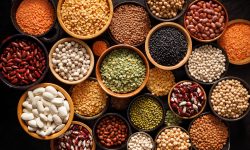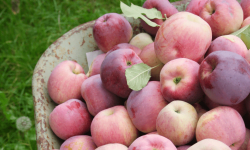Donating 10,000 meals in Pulses! For #WorldPulsesDay Spud is donating 10,000 meals worth with pulses…
Growing up, I learned that a freezer is a machine that stops time by freezing things. At least that’s the way my parents explained it to me when I asked why they keep freezing perfectly good loaves of bread. Of course, when I grew up I learned that freezing food was an effective preservation method for fruits, vegetables, meat, and even cooked meals (nothing beat opening countless yogurt containers only to find frozen Indian food). Heck, every summer, my family freezes bags full of blueberries so we can enjoy them all year!
Now that I’m entering adulthood, my fascination with freezing fresh and cooked foods shifted to skepticism. I would hear so much about the benefits of fresh food, that frozen food became the enemy. But, the truth is, frozen food is just as good, if not better than fresh food. Yup, you read that correctly!
Freezing food doesn’t kill nutrients.
The great thing about shopping local is that the produce you’re buying is incredibly fresh and is generally at contains the highest nutrient value available. But, over time, fresh produce loses much of its nutrients. This happens simply because they are slowly expiring, it’s natural. However, there’s a way to retain their nutrients for another time: freezing.
If you think about it, if you’re not shopping local, fresh produce takes a few days to make it to the shelves of your grocer. Assuming you purchase the produce the very day they arrived, you’ll be enjoying 3-day-old produce at best, that’s 3 days of nutrient loss. Of course, you’ll be enjoying much of your produce days later, giving the items more time to lose nutrients. Freezing stops the process dead in its tracks, and if you’re shopping locally, you’ll be enjoying the freshest possible produce weeks, even months later.

Here’s how you can freeze almost any fruit or vegetable:
Fruits
For fruits, freezing is simple! You’ll only want to be sure you pick out any fruits and berries that are aged or on the verge of going bad. A bad apple spoils the bunch, and even though you’re freezing the fruits and berries, you don’t want to run the risk of them spoiling before they freeze. For berries, you can freeze them whole, but for fruits such as apples and mangos, you’ll want to cut them up before freezing. After sorting, wash them well and strain all excess water, pat dry, and place them in a freezer bag. Be sure to leave about ¼ of the bag empty. Freeze and enjoy!
Freezing fruit can be a little more complicated, but if you’re willing to put in the extra effort it can go a very long way. Check out our guide on how to freeze fruit to see how you can best preserve specific fruits.
Vegetables
Vegetables can be a little tricky because of one extra step. That step is blanching, something that is important for vegetables (and fruits that are treated like vegetables such as zucchini and squash) as it prevents browning and softening, allowing for the veggies to be of a more desirable texture when thawed. Blanching is essentially a quick bath in boiling water followed by an ice cold dip to stop any potential cooking that is occurring. The trick is to boil for 45-60 seconds then, using a slotted spoon, scoop up the chunks and put them directly into the ice cold water and remove. Pat them dry and place in a freezer bag and pop it into the freezer.
Be careful when it comes to blanching, though. While freezing may not cause a depletion of nutrients, over-boiling can. Many nutrients are sensitive to heat and if you over boil or wait too long to run the vegetables under cold water, you may lose some of the nutritional value the specific vegetable contains.
The freezer is your friend when it comes to fresh food preservation, and if you’re doing it right, you produce will taste as fresh as the day you froze ‘em! Give it a try and let us know what you decide to freeze! It’s really the best way to enjoy your favourite produce out of season!






